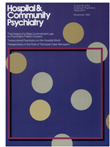Transcultural Psychiatry on an American Psychiatric Ward
Abstract
Transcultural psychiatry is generally thought to be an appropriate concern only in distant or unusual environments. But because many immigrant groups in the U.S. maintain their original customs and traditions, a transcultural approach may be necessary in many clinical situations, as illustrated by the case histories of three immigrant patients on a university hospital's psychiatric service. All had manifestations of severe psychiatric disturbance, but their clinical evaluation and management were complicated by difficulties in communication and by culturally linked behavior patterns and family responses at variance with American norms. Careful attention to transcultural factors is necessary for the optimal management of such cases.
Access content
To read the fulltext, please use one of the options below to sign in or purchase access.- Personal login
- Institutional Login
- Sign in via OpenAthens
- Register for access
-
Please login/register if you wish to pair your device and check access availability.
Not a subscriber?
PsychiatryOnline subscription options offer access to the DSM-5 library, books, journals, CME, and patient resources. This all-in-one virtual library provides psychiatrists and mental health professionals with key resources for diagnosis, treatment, research, and professional development.
Need more help? PsychiatryOnline Customer Service may be reached by emailing [email protected] or by calling 800-368-5777 (in the U.S.) or 703-907-7322 (outside the U.S.).



